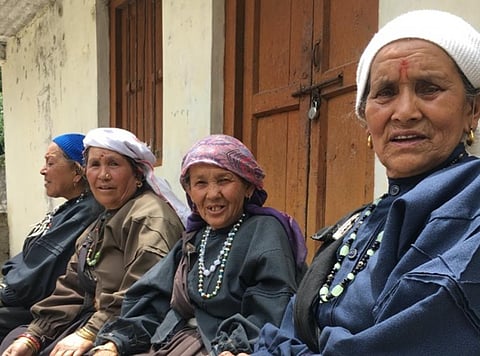International Day of Rural Women: It’s time we recognise their lives and livelihood
Rural women are the drivers of developed as well as developing economies. Not only do they play a crucial role in shaping families and societies, they are actively involved in on-farm and off-farm activities. Their engagement diversifies family livelihood, and yet, their efforts largely go unappreciated.
Rural women can be decisive leaders: But structural constraints of gender, negative ideologies, lack of economic assets and a patriarchal society weigh them down. Gender-based stereotypes and discrimination deny these women their right to resources, opportunities and / or a social life.
They lack access to land, resources, road, infrastructure, connectivity, education and health, which affects the human development and economic empowerment disproportionately. While rural women face similar challenges, their vulnerabilities may vary in terms of region or ethnicity.
The first ever International Day of Rural Women was celebrated more than a decade ago on October 15, 2008. It recognised “the critical role and contribution of rural women, including indigenous women, in enhancing agricultural and rural development, improving food security and eradicating rural poverty,” according to the United Nations.
The situation of rural women in the remote areas of the Himalayas — by the virtue of difficult terrain and impacts of climate change — paints a different picture. Women in the mountains are knowledgeable, independent and acutely aware of their role in the local community.
Women in the mountains are knowledgeable and independent. Photo: Rommila Chandra
They are at the heart of the production system — they manage agriculture, food security and nutrition and natural resources. The cultural integrity of mountain areas is still more intact in comparison to their lowland counterparts, thus giving them a command on household- livelihood system.
But the road is not as smooth. Remoteness, isolation and internet connectivity are among the major obstacles. The lack of infrastructure affects access to basic services for survival; while these problems cut across all communities, they have a differential burden on rural women in particular. With the global threat of climate change, its impact on rural livelihood inordinately affects the well-being of women as well.
Agriculture employs many a rural women: The corresponding need to employ climate-resilient agricultural interventions for household food and nutrition security becomes an economic constraint for them. This elevates their financial crisis and stress, affecting their mental health.
Moreover, the prevalence of gender biasness of society means a rural woman has to walk several extra miles to source water, fodder and bio-fuel. For this, they lose valuable time that they could have invested in some productive activity outside their domestic lives. They fail to dedicate sufficient efforts to the intensive climate-resilient farming which is extremely time-sensitive.
Rural women are active agents of socio-economic change and environmental conservation. Photo: Rommila Chandra
Even with considerable independence (which is often denied to many), the plight of rural women in the Himalayas is the same — they are undernourished, under-compensated and under-represented.
All these issues are inter-dependent; institutionalisation of a gender-responsive approach is, therefore, required. There is a need to ensure that adequate investments are made to implement national plans and policies for rural women.
To ensure that women exercise their fundamental rights, it is essential that legal arrangements on gender equality are reinforced. The multilevel accountability of the initiative would help rural women contribute to and benefit from the sustainable development activities.
Rural women are active agents of socio-economic change and environmental conservation. But more often than not, they are confined to the roles of a homemaker, caregiver, farmer and consumer.
More importantly, rural-indigenous women play a pivotal role in ensuring food security by participating in all levels of the process — from production to distribution to utilisation.
They are responders, adopters and decision-makers and should be made an integral part of solutions that lead us to a sustainable future.
This year, the spotlight is on the urgent need to build resilience (Rural Women & Girls Building Resilience is the theme) in the wake of the novel coronavirus disease (COVID-19) pandemic.
Rural women are at the heart of food production system. Photo: Rommila Chandra
This day serves as a reminder that a sustainable future is not possible without the involvement of women. It is the moral and ethical imperative of the society to support gender equality in this era of unsustainability. Rural women must be at the core of all developmental activities.
Gender inequality excludes women from multiple walks of life and hampers their accessibility to resources. It is time to reverse this trend — and to hear their voices loud and clear. It would be a missed opportunity to achieve sustainable development goals if a nation does not utilise the knowledge of its rural women.


